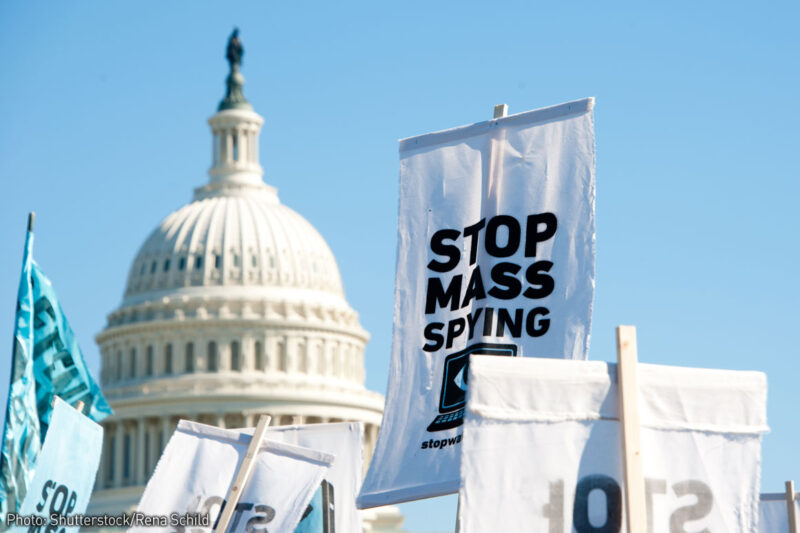
This piece originally appeared at .
How would you feel if the Federal Bureau of Investigation could get information about websites you visited or emails you sent ‚Äď without ever getting permission from a judge? Would you begin to self-censor the websites you visited ‚ÄĒ maybe avoiding revealing sites? Or, avoid emailing your pastor, therapist, or lawyer? These scenarios may soon no longer be hypothetical.
Some senators are looking for a way to expand Patriot Act provisions that allow warrantless surveillance of Americans. This morning, the Senate will vote on a proposal to expand the ability of the FBI to gather sensitive information about Americans‚Äô online communications ‚ÄĒ potentially including browsing history, location information from IP addresses, and the to/from lines of an email ‚ÄĒ without a court order.
While the FBI has labeled this merely a ‚Äú‚ÄĚ fix, it is anything but. To fully understand the disingenuousness of this characterization, a bit of history is helpful.
In 2001, the Patriot Act expanded the FBI‚Äôs ability to gather certain types of records using only an administrative subpoena, called a ‚ÄúNational Security Letter.‚ÄĚ This new authority, which Congress now seeks to expand, explicitly limits the type of information that the FBI can collect to name, address, length of service, and tolling records (i.e. essentially phone billing records).
The change gutted protections historically afforded to Americans as a buffer against government abuse. Specifically, the Patriot Act reduced the standard necessary to obtain the specified information, requiring that it only be ‚Äúrelevant‚ÄĚ to an authorized terrorism or counterterrorism investigation. Simultaneously, it increased the number of officials who could authorize NSLs, including agents at FBI field offices across the country. This is virtually identical to the language we now know was used to justify the collection of .
In the past ten years, the FBI has issued over 300,000 NSLs. So, why has the average American never even heard of this? In one word: secrecy. The vast majority of NSLs are accompanied by a ‚Äúgag‚ÄĚ order preventing companies from telling the public that they have received a request for personal information about them or informing customers of the information they have been forced to disclose.
That’s why the public was unaware for years that the FBI had been abusing NSLs. According to a report issued by the inspector general, NSLs were used to collect information in bulk and to gain access to private information in cases that were not even relevant to FBI investigations.
NSLs were also being used to try to force companies to turn over ‚Äúelectronic communications transactional records‚ÄĚ ‚ÄĒ which can include things like browsing history, IP address, or email metadata. In 2008, the DOJ‚Äôs Office of Legal Counsel issued a legal opinion finding that Congress had never authorized the FBI collect these types of records with an NSL. We now know that after this opinion was publicly released, some companies began to resist government attempts to force them to turn over these sensitive records without a court order.
This brings us to the present. Just a year after Congress overwhelmingly voted to try to rein in government surveillance abuses, the Senate is now considering an amendment that would once again expand government surveillance and allow the FBI to gather these sensitive online records with just an NSL. This proposal is also currently included in the Senate Intelligence Authorization bill that has yet to pass the chamber, and there have been efforts to attach it to Electronic Communications Privacy Act reform.
We, along with other civil society groups and technology companies like Google, Microsoft, and Yahoo, strongly oppose the proposal. To be clear, we are not opposed to the FBI ever obtaining this information as part of a terrorism investigation. But, we believe that the government must do what the current law already permits ‚ÄĒ get a court order. To require anything less would give the government free court-side seats to view the most intimate aspects of Americans‚Äô lives, with inadequate accountability, transparency, and oversight.

